
Glass and spindle balustrades have become increasingly popular in UK homes, but many parents and pet owners naturally wonder about their safety. The good news is that when properly installed and manufactured to UK standards, glass balustrades are exceptionally safe for families – often safer than traditional wooden alternatives.
At StairFurb, we’ve helped thousands of UK families transform their staircases with our made-to-measure glass balustrade kits, and safety is always our top priority. Let’s address your concerns and explain exactly why glass balustrades are a smart, safe choice for your home.
All glass used in balustrades must be safety glass – this isn’t optional, it’s required by UK Building Regulations. There are two main types:
For residential stair balustrades, toughened glass is the standard choice and must meet BS EN 12150 certification, which guarantees it has passed rigorous strength and safety tests. Every glass panel in our kits carries this certification, and you’ll see the small kite mark etched into each piece as proof of compliance.
| Property Type | Horizontal Load Requirement |
| Residential | 0.36kN per metre |
| Commercial | 1.5 kN per metre |
This is equivalent to someone pushing quite hard against the glass
Many companies use 10mm, 12mm, or even thicker glass, but our 8mm toughened glass meets all UK safety requirements while offering practical advantages for DIY installation.
The 8mm thickness easily exceeds the load-bearing capacity required for residential use, and in testing, our panels consistently handle loads well above the 0.36kN/m standard before showing any deflection.
A typical 1-metre glass panel weighs around 20kg, which is heavy enough to feel substantial but light enough for two people to handle safely during installation. Compare this to thicker alternatives:
The fact that these glass balustrades save on weight doesn’t compromise the safety in any way. The strength of this type of balustrade comes from the toughening process, and not necessarily just the thickness alone. Our 8mm panels are actually stronger than ordinary 20mm glass because of how they’re manufactured, while being significantly more budget-friendly for homeowners looking to upgrade their stairs.
Glass balustrades are particularly good for families with children and pets, often safer than traditional alternatives.
While UK regulations require minimum heights of 900mm for internal stairs and 1100mm for external applications, we can manufacture panels up to 1200mm or higher for families with very young children who might need that extra security. However, the maximum achievable height will depend on your existing newel posts, as our kits work with your current staircase structure.
No entrapment risk – pets can’t get stuck between spindles like they might with traditional wooden balustrades
Damage resistant – the smooth surface means there’s no risk of scratching or chewing damage to your balustrade
Easy cleaning – muddy paw prints wipe away easily without leaving permanent marks
No splinter risk – completely safe surface for curious pets who might brush against it
Rounded Glass Edges: All ‘exposed’ glass edges or corners are polished and slightly rounded during manufacture, which means there are no sharp edges or rough cuts that could cause injury.
Tamper-Resistant Fixings: Children can’t easily remove or loosen glass panels once they’re installed, and there are no small parts that could become choking hazards.
Smooth Handrails: Oak and painted timber options have comfortable, splinter-free profiles that are safe for the whole family to use.

Proper installation is crucial for safety, but our kits are designed to make this straightforward for competent DIYers who want to tackle the project themselves.
Each kit includes:
| Component | Function |
| Handrail clamps | Prevent outward movement under horizontal loads |
| Base rail | Prevents inward movement, provides vertical support |
| Stainless steel fixings | Maintain strength for decades, resist corrosion |
Consider professional fitting if you have unusual angles or curved sections, older properties with uneven floors or walls, stone or concrete stairs requiring specialist fixings, or complex modifications to existing structures.
Our Find a Fitter service connects you with local joiners experienced with StairFurb installations. Fitting costs are separate from the kit price, which keeps our pricing competitive while still offering professional support when you need that extra help.
UK Building Regulations might seem complex, but the key requirements for glass balustrades are actually quite straightforward once you understand them.
| Location | Minimum Height |
| Internal stairs & landings | 900mm |
| External balustrades | 1100mm |
| Areas near windows | Additional restrictions apply |
Heights measured to top of handrail or glass, whichever is higher
The regulations state that no gaps should allow a 100mm sphere to pass through. While our glass balustrade systems do have gaps of approximately 20mm between each panel, our online configurator calculates the bespoke glass sizes to ensure no gaps exceed regulation requirements. There’s also a small cleaning gap at floor level, which is typically 10-15mm and perfectly acceptable under current regulations.
For the glass panels (infill): 0.74 kN/m
For handrails: 0.36 kN/m vertically downward
Our 8mm toughened glass comfortably exceeds these requirements, and our handrail systems are tested to much higher loads than what’s actually required by law.
Building Control approval is usually not required for simple balustrade replacement, but may be required for structural changes or new builds, so it’s worth checking with your local authority if you’re unsure about your specific situation.
Toughened glass is designed to be safe even in the unlikely event of breakage, and understanding what happens helps address the common concerns people have about glass balustrades.
When toughened glass breaks, it shatters into thousands of pea-sized pieces with relatively blunt edges rather than the sharp shards you’d get from ordinary glass. These pieces fall downward rather than projecting outward, and this safe breakage pattern is actually designed into the toughening process from the beginning.
Spontaneous breakage occurs in less than 0.1% of panels and is usually caused by rare nickel sulphide inclusions, though quality manufacturers like our suppliers screen for these inclusions during production to minimise even this tiny risk.
If a panel were to break, the remaining structure would continue to provide protection, as the handrails and adjacent panels remain intact.
Compared to traditional materials:

Glass balustrades maintain their safety properties much better than traditional materials over time, which makes them a smart long-term investment for your home.
| Material | Degradation Risk | Maintenance Need |
| Glass | None – chemically inert | Minimal cleaning |
| Wood | Rot, split, loose fixings | Regular treatment, replacement |
| Metal | Corrosion (especially coastal) | Regular cleaning, repainting |
Monthly: Clean glass with standard glass cleaner to keep it looking pristine
Annually: Check the tightness of visible fixings to ensure everything remains secure
After severe weather: Inspect for any movement or damage, though problems are extremely rare
Our warranty covers manufacturing defects and premature failure for years after installation, including the glass panels, all metalwork, and the fixing systems. This reflects our confidence in the long-term safety and performance of our products, and gives you peace of mind about your investment.
The engineering community consistently confirms that glass balustrades can be as safe as any other type when they’re properly designed and installed. The critical success factors are appropriate glass specification, correct fixing design, and proper installation quality – all areas where our bespoke approach ensures everything is calculated specifically for your staircase.
Yes, glass balustrades are particularly safe for families because the smooth surface prevents climbing, there are no gaps for entrapment, and the transparent design allows better supervision. Glass is also hygienic and easy to clean around children and pets.
UK Building Regulations don’t specify minimum thickness, only that glass must meet load requirements. Our 8mm toughened glass exceeds all residential safety standards while being lighter and more cost-effective than thicker alternatives.
Yes, our glass balustrade kits are designed to meet all relevant UK Building Regulations for residential properties. The glass is BS EN 12150 certified, and the systems meet load and height requirements.
Toughened glass is designed to break safely into small, relatively blunt pieces rather than dangerous shards. It should be noted, though, that breakage is extremely rare.
Our kits are specifically designed for competent DIY installation since components come pre-cut and pre-drilled with detailed instructions and video guides. For complex installations, our approved fitter network provides professional support.
UK regulations require minimum heights of 900mm internally and 1100mm externally. These heights prevent children from climbing over while allowing adults to use handrails comfortably. Higher panels can be specified for extra security with very young children.
Yes, 8mm toughened glass easily exceeds UK load requirements for residential balustrades since the strength comes from the toughening process, not thickness alone. Our 8mm panels are stronger than much thicker ordinary glass.
Handrails aren’t always required by regulations if the glass extends to the full required height and meets load requirements. However, handrails provide additional grip and confidence, particularly for elderly users or external installations.
Glass balustrades represent a safe, stylish, and practical choice for UK homes. Our bespoke kits combine proven safety with DIY-friendly installation, backed by expert support and our Price Match Promise. Made in the UK to exacting standards, StairFurb glass balustrades offer families a secure, low-maintenance solution that will look great and perform safely for years to come.
Considering glass balustrades for your home? Request your free quote today and discover just how budget-friendly our professional-quality kits can be.
Yes, glass balustrades are particularly safe for families because the smooth surface prevents climbing, there are no gaps for entrapment, and the transparent design allows better supervision. Glass is also hygienic and easy to clean around children and pets.
UK Building Regulations don’t specify minimum thickness, only that glass must meet load requirements. Our 8mm toughened glass exceeds all residential safety standards while being lighter and more cost-effective than thicker alternatives.
Yes, our glass balustrade kits are designed to meet all relevant UK Building Regulations for residential properties. The glass is BS EN 12150 certified, and the systems meet load and height requirements.
Toughened glass is designed to break safely into small, relatively blunt pieces rather than dangerous shards. It should be noted, though, that breakage is extremely rare.
Our kits are specifically designed for competent DIY installation since components come pre-cut and pre-drilled with detailed instructions and video guides. For complex installations, our approved fitter network provides professional support.
UK regulations require minimum heights of 900mm internally and 1100mm externally. These heights prevent children from climbing over while allowing adults to use handrails comfortably. Higher panels can be specified for extra security with very young children.
Yes, 8mm toughened glass easily exceeds UK load requirements for residential balustrades since the strength comes from the toughening process, not thickness alone. Our 8mm panels are stronger than much thicker ordinary glass.
Handrails aren’t always required by regulations if the glass extends to the full required height and meets load requirements. However, handrails provide additional grip and confidence, particularly for elderly users or external installations.
Glass balustrades represent a safe, stylish, and practical choice for UK homes. Our bespoke kits combine proven safety with DIY-friendly installation, backed by expert support and our Price Match Promise. Made in the UK to exacting standards, StairFurb glass balustrades offer families a secure, low-maintenance solution that will look great and perform safely for years to come.
Considering glass balustrades for your home? Request your free quote today and discover just how budget-friendly our professional-quality kits can be.
Newsletter Signup
Copyright © 2026 Stairfurb. StairFurb is the trading name of Homespace Installations Ltd; a company registered in England & Wales with the incorporation number 09287041. Please note that StairFurb is not authorised by the Financial Conduct Authority, and we do not offer financial advice. We have an affiliation with Zopa Embedded Finance Limited trading as Dividebuy (14602085). Any credit agreement with this provider may not fall under the jurisdiction of the Financial Ombudsman Service. Credit may be available to permanent UK residents aged 18+, subject to status. Any missed payments may affect your ability to obtain credit from DivideBuy and other lenders. Please spend responsibly.

Share pictures of your staircase and we'll provide a quote, plus offer expert help with measurements with a video call.
Grab your tape measure and follow our step-by-step video tutorials to get your quote
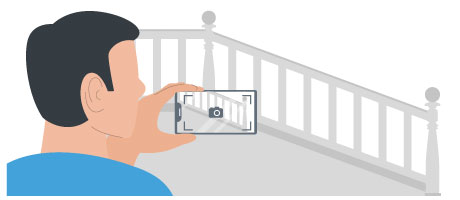
Simply take a photo of each balustrade section and let us know which style you want. We’ll then estimate your dimensions and provide an idea of price.
 GET PHOTO ESTIMATE
GET PHOTO ESTIMATE
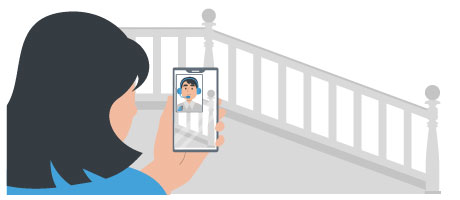
Get help measuring and a free no-obligation quote on a free 20-minute video call from the comfort of your own home. Speak with our expert team about your staircase upgrade.
 BOOK CALL NOW
BOOK CALL NOW
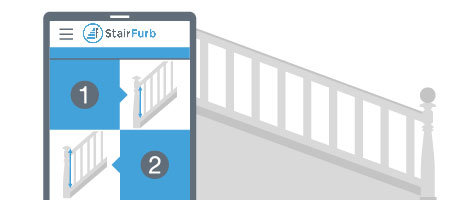
Measure your staircase using our online video tutorials and input them into our online configurator for a free, no-obligation quote. It takes less than 15 minutes.
 START DIY QUOTE
START DIY QUOTE
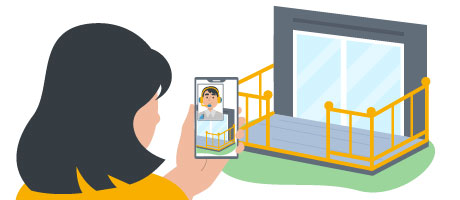
Get help measuring and a free no-obligation quote on a free 20-minute video call from the comfort of your own home. Speak with our expert team about your staircase upgrade.
 BOOK CALL NOW
BOOK CALL NOW
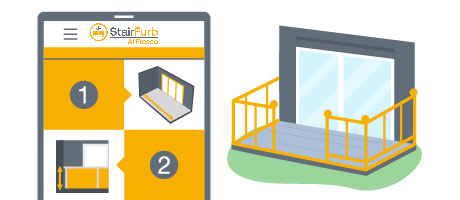
Measure your staircase using our online video tutorials and input them into our online configurator for a free, no-obligation quote. It takes less than 15 minutes.
 START DIY QUOTE
START DIY QUOTE
We've received your form and will be in touch shortly. To make sure we connect you with the right person, please keep an eye on your WhatsApp messages. We'll send you a quick message there that you'll need to respond to.
Please try again or contact us directly.